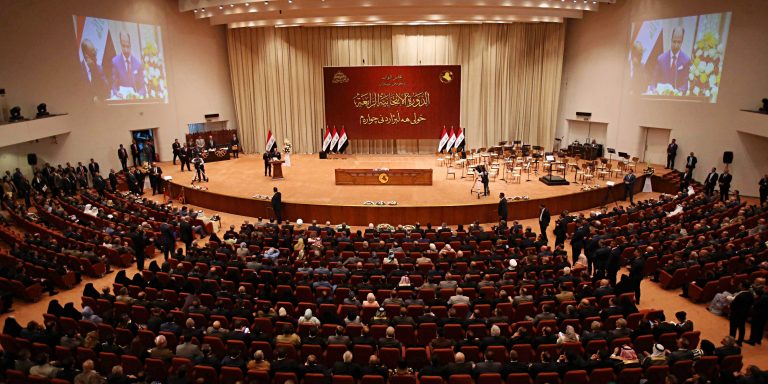INTELBRIEF
March 10, 2022
IntelBrief: Political Instability Continues to Plague Iraq as Power Brokers Clash

Bottom Line up Front
- Iraqi leaders are struggling to form a new government five months after national elections.
- Despite holding a commanding bloc of parliament seats, supporters of Shia cleric Muqtada al-Sadr have not installed their preferred candidate as Iraq’s ceremonial president.
- Both Iran and the United States seek to influence Iraqi leaders to form a new government favorable to their interests.
- A new report by the U.S. Defense Department asserts that Iraq’s government is unwilling or unable to exert effective control over numerous Iran-backed militia forces.
On January 9, Iraq’s 329-seat National Assembly (parliament), elected in October, got off to a late but promising start in its efforts to form a new government by selecting an Assembly Speaker. The speakership selection set off a thirty-day deadline (by February 8) to name a president, which by informal agreement is to be a Kurdish figure. Despite an unexpected competition between the two main Kurdish factions for that nomination, a vote was scheduled February 7 to select as president veteran Kurdistan Democratic Party (KDP) figure Hoshyar Zebari. Shia cleric Muqtada al-Sadr, who seeks to distance Iraq from Iran, had thrown the substantial weight of his faction—a 73-seat bloc in the Assembly—behind the pro-Washington Zebari. The veteran Kurdish figure served as foreign and finance minister in previous post-Saddam governments. However, Iraq’s federal court suspended his candidacy due to corruption charges dating from his time as finance minister, and the vote was postponed indefinitely. The suspension has not only thrown the government formation process into turmoil, but it also sets back al-Sadr, who is attempting to establish a government that largely excludes his pro-Iran Shiite rivals and distances Baghdad from Tehran.
Political factions linked to the various Tehran-backed militias fared poorly in the October elections but have sought to exert influence through the use of and threats of further violence. Bowing to the court ruling, al-Sadr withdrew his support for Zebari, but it is not clear whether the KDP will name a new candidate or try to overturn the court ruling. The dispute over the presidency delays formation of a new government, because it is the president who, under Iraq’s constitution, selects a prime minister nominee to assemble a new cabinet, subject to confirmation by the parliament. The federal supreme court compounded the political uncertainty on February 15 by ordering all crude oil outputs from the semi-autonomous Kurdish region to be handed over to the oil ministry in Baghdad and voiding Kurdish oil contracts with foreign oil firms, including U.S. major Chevron.
The political turmoil in Iraq is of direct interest to two main outside actors exerting influence in Iraq—the United States and the Islamic Republic of Iran. The day after the presidential vote postponement, Esmail Qaani, the head of Iran’s powerful Islamic Revolutionary Guard Corps’ Quds Force (IRGC-QF), visited Baghdad to press al-Sadr for the selection of pro-Iranian candidates as Iraq’s next leaders. An Iraqi government that might seek to disarm Qods Force-backed armed groups such as Kata’ib Hezbollah and Asa’ib Ahl Al Haq is anathema to Tehran. Iran’s primary objective in supporting such groups is to compel the remaining U.S. forces in Iraq, who transitioned to an advisory role at the end of 2021, to leave Iraq entirely. Yet, Qaani’s visit was not necessarily successful; al-Sadr reiterated his call for a government of “national majority”—phraseology indicating that he will ally with Iraq’s Sunni and Kurdish leaders rather than pro-Iranian Shia groups. The composition of Iraq’s next government is also of keen interest in Washington, which continues to assist Iraqi forces against elements of the Islamic State that are still active in parts of Iraq. U.S. officials have pressed their contacts in the Iraqi power structure to select leaders who want U.S forces to remain in Iraq and will act against the Iran-backed militias. Attacks on U.S. bases in Iraq by the militias have complicated the joint U.S.-Iraqi mission against the Islamic State and pose a threat to the lives of U.S. and Iraqi military personnel, U.S. diplomats in the country, and Iraqi civilians.
The latest report by the U.S. Defense Department’s Lead Inspector General for Operation Inherent Resolve (the U.S. mission to combat the Islamic State), released in mid-February and covering the last three months of 2021, provided political ammunition for leaders in Baghdad who want to curb Iran's influence in Iraq. The report highlighted an increasing number of attacks by pro-Iranian militias against U.S. interests in Iraq (and Syria) during that time period and, perhaps more pointedly, assessed that Iran-backed Shia militias have infiltrated Iraqi security forces. According to the report, the increase in attacks against U.S. forces was due primarily to the "strong ties" that the militias and Iran enjoy with "some elements of Iraq's traditional security forces," as well as the government's weakness in confronting the militant elements to restrain them. The report also criticized the government’s inability to hold the Iran-backed groups to account, stating, "The Iraqi government's ability to assert control over the Popular Mobilization Committee [PMC, the official term for the broad swath of militias recruited to fight the Islamic State challenge in 2014] or hold its affiliated militias accountable remained tenuous." Iraq's Federal Police and Emergency Response Division and the Army's 5th and 8th Divisions were also specified in the report as "the units thought to have the greatest Iranian influence," resulting in pro-Iran officers and figures being "scattered throughout the security services." The U.S. Defense Department report, coupled with the stalled Iraqi government formation process, paints a picture of an Iraq still struggling to find stability and to cut off Tehran’s numerous, overlapping tentacles that reach into every facet of life. Whether Iraqi leaders succeed in reducing the influence of Iran will determine whether Iraq can fully rejoin the Arab fold.